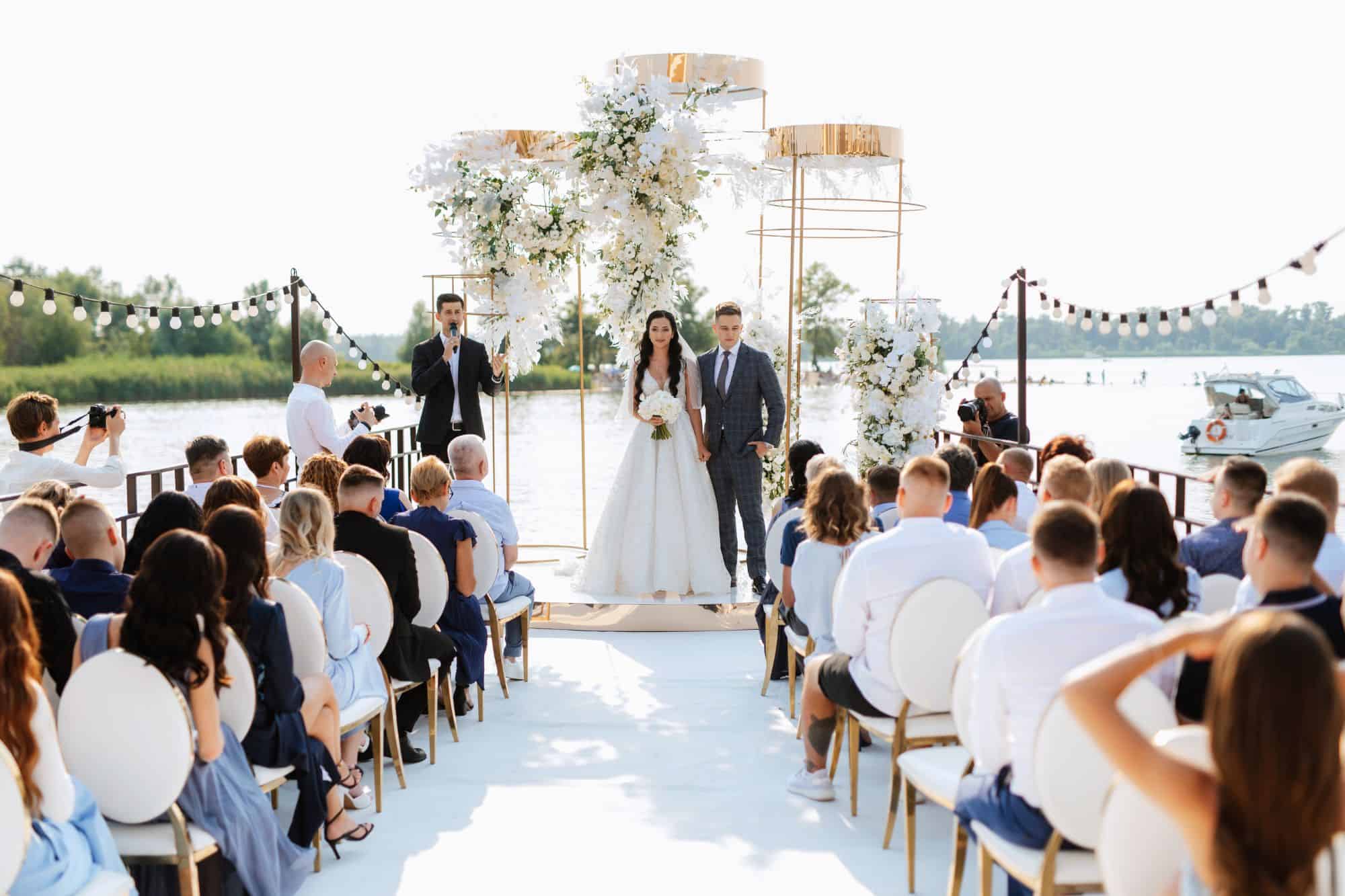Choosing the right wedding date can set the tone for your entire celebration. It’s a decision that impacts everything—from your venue and guest list to your budget and honeymoon plans.
Whether you’re drawn to a sentimental date or one that works best with logistics, there are many factors to balance.
From considering the season and weather to checking venue availability and guest schedules, finding the perfect date requires careful thought.
This guide offers key insights to help you choose a wedding date that aligns with your vision and ensures your special day goes off without a hitch.
Let’s get straight to the point.
Choosing a wedding date involves balancing various factors such as season, budget, venue availability, and guest convenience.
Different times of the year impact costs and the atmosphere, with peak seasons like spring and summer often pricier.
Considering the weather, vendor schedules, and important family or cultural dates helps ensure a smooth event.
Flexibility is key—whether prioritising personal significance or practical logistics.
Early planning for destination weddings, legal requirements, and major local events can prevent complications.
Ultimately, the ideal date aligns with your vision, allowing you and your guests to enjoy the celebration fully.
How To Choose The Perfect Wedding Date
Choosing a wedding date is a key part of planning your special day. The right date affects everything—from the venue to guest availability and your budget.
While it may seem straightforward, selecting a date involves balancing many factors to ensure it works for you and your loved ones. Here’s a guide to help you pick the perfect wedding date.
Choose A Time Of Year
The time of year you pick will set the mood for your wedding. Every season comes with its benefits and challenges.
For example, spring and autumn are popular due to their mild weather. However, these seasons are also in high demand, making venues more expensive.
Winter weddings can offer a more intimate atmosphere and lower costs, but you’ll need to plan around the weather, especially for outdoor ceremonies.
Summer weddings, on the other hand, have long days and warm weather, but due to the season’s popularity, you’ll need to think about guest comfort and higher vendor prices.
Consider Your Budget
Your budget plays a big role in choosing your wedding date. Like spring and summer, peak wedding seasons often come with higher costs for venues, photographers, and caterers.
If you’re working with a tight budget, consider having your wedding in the off-season. Winter and late autumn are often less expensive.
If you’re flexible with your date, choosing a weekday or Sunday wedding could also help save money. Saturdays are the most popular day for weddings, and vendors often charge a premium for those dates.
Check Venue Availability
Once you’ve narrowed down your preferred season and budget, your next step is to check venue availability.
Some popular venues can book out over a year in advance, especially during peak wedding seasons. If your heart is set on a particular venue, you might need to be flexible with your wedding date to secure it.
It’s also wise to ask the venue about their policies regarding cancellations, rescheduling, and deposits. Booking early will help ensure you get the date and venue you want.
Choose A Significant Date
Some couples prefer to get married on a date that holds personal meaning.
It could be the anniversary of their first meeting, a family milestone, or another special day in their relationship. A date with sentimental value can make your wedding even more memorable.
However, it would help if you also considered any potential conflicts with holidays or other significant events.
For instance, getting married on New Year’s Eve might sound exciting, but it could increase guest attendance and costs.
Factor In Guest Availability
Your guests’ schedules are another important consideration when selecting your wedding date.
Consider whether you want a small or large wedding and how many people will be able to attend based on the date you choose.
Public holidays may seem ideal for giving guests extra time to travel, but they can also cause conflicts.
Some guests may have prior commitments, and travel costs tend to rise around holiday periods. Make sure the date is convenient for key guests, especially those travelling from out of town.
Weather Considerations
Weather can make or break a wedding, particularly if you’re planning an outdoor ceremony. Be sure to research typical weather patterns in your chosen location for the time of year.
Summer weddings can be beautiful, but consider if the area tends to get uncomfortably hot or rainy. For winter weddings, think about how cold or wet it might get.
If you’re opting for an outdoor wedding, have a backup plan. Book a marquee or ensure your venue has an indoor space in case the weather changes. This will help your wedding day go smoothly, no matter the conditions.
Avoid Major Local Events
Before locking in your wedding date, check if any major local events are happening around your venue. Sporting events, festivals, and conventions can drive up accommodation prices and make it harder for your guests to find places to stay.
These events can also cause traffic and crowding, which might disrupt your wedding day. Researching the local calendar in advance can help avoid these problems and ensure your day is stress-free.
Plan For Honeymoon Timing
If you plan to go on a honeymoon immediately after your wedding, consider how your wedding date fits your travel plans. Certain times of year are better suited for certain destinations.
For instance, if you’re planning a tropical honeymoon, you’ll want to ensure your wedding date aligns with the dry season in that region.
Timing your honeymoon around your wedding date can also help you take advantage of off-peak travel deals or avoid the crowds at popular destinations.
Cultural And Religious Considerations
If you or your partner come from a background with cultural or religious traditions, consider important dates or holidays when choosing your wedding day.
Some couples may want to avoid certain religious holidays or observe traditions aligning with their family values.
Checking with your families is a good idea to ensure the wedding date works for everyone. This will help avoid scheduling conflicts and ensure everyone can participate in the celebrations.
Allow Enough Time For Planning
How much time you have to plan your wedding will also affect your date selection. Larger weddings with more moving parts will require more time to organise.
A typical timeline for a big wedding is 12 to 18 months, which gives you time to book venues, send out invitations, and finalise all the details.
If your wedding is smaller, you might be able to plan everything in six to nine months. Either way, give yourself enough time to plan without feeling rushed.
Vendor Availability
Popular vendors—photographers, caterers, and florists—can get booked quickly, especially during peak seasons. Once you have a shortlist of potential dates, contact your preferred vendors to check their availability.
If your desired vendor is booked on your chosen date, you may need flexibility. Securing your venue and vendors early helps streamline planning and reduces the risk of last-minute surprises.
Should You Choose A Holiday Weekend?
Holiday weekends seem ideal for weddings since guests have extra time off work. However, they can also come with challenges.
Travel costs are usually higher during these times, and accommodation in popular holiday destinations may be limited or more expensive.
If you opt for a holiday weekend, send out save-the-dates early so guests can make their travel plans. This will give them plenty of time to book flights and accommodation before prices increase.
Work Schedules
Your work schedule and your partner’s should also factor into the decision. Avoid planning your wedding during a busy time at work, as this could add unnecessary stress.
Additionally, ensure you’ll both be able to take time off for the wedding and honeymoon without causing disruptions to your professional lives.
Choosing a date that fits your work schedule will help you enjoy the planning process and the big day without feeling overwhelmed.
Flexibility Is Key
Flexibility is essential when choosing your wedding date. While you might have an ideal date in mind, factors like venue availability, guest schedules, and weather conditions could affect your final decision.
Being open to a range of dates will make securing your dream venue and vendors easier. Having a few different options in mind will also help if something unexpected arises during the planning process.
Destination Weddings
If you’re planning a destination wedding, your date will need to accommodate travel schedules, local weather, and accommodation availability.
Research the best time of year to visit your destination and choose a date that fits these factors.
Send out save-the-dates early for destination weddings to give your guests plenty of time to plan. This will help ensure that everyone can join you without feeling rushed.
Sentimental Or Practical?
Some couples want a date with personal meaning, while others prefer a date that works best for logistics.
A sentimental date, such as the anniversary of your first date, can add a special touch to your wedding, but practical dates are often easier to plan around.
Choosing between a meaningful date and a practical one will depend on what’s most important to you as a couple. Both options have benefits, so weigh the pros and cons to make the best decision.
Legal Requirements
Remember to check the legal requirements in your area. Some places require you to give notice or apply for a marriage licence within a certain timeframe before the wedding.
Ensure you meet all legal deadlines well ahead of time to avoid any last-minute complications.
Having all your legal documents in place will help your wedding day run smoothly.
Conclusion
Choosing the perfect wedding date involves considering many factors—from venue availability to weather, guest schedules, and your personal preferences.
By considering these and being flexible with your options, you’ll be able to find a date that suits your needs and vision.
Whether it’s a meaningful day or one that fits practical needs, the most important thing is to choose a date that allows you to enjoy your wedding day to the fullest, surrounded by the people who matter most.
Frequently Asked Questions
How soon should you pick a wedding date?
If you’d like to get married in under a year, we recommend securing your date about four weeks after getting engaged.
Allow enough time to speak with family and friends regarding the best date and any prior commitments.
How do you pick your wedding date?
- Choosing a Date.
- Plan around your honeymoon, if you plan to take one.
- Pick the season or the month in which you’d like to get married.
- Consider the day of the week.
- Decide whether you want to be married indoors or outdoors.
- Research the weather.
- Think about how long you’d like to be engaged.
- Consider the budget.
What month has the most successful marriages?
The most popular months to get married are from the months of May to October. More specifically, September takes first place at 16 percent, followed by June with 15 percent, and lastly October, at 14 percent. This means that the most popular wedding seasons are Fall/Autumn, and Summer.
What’s the cheapest month to get married?
January, March, April, and November can be far less expensive months for marrying. Venue prices may be lower, and vendor prices are likely to be significantly lower simply because the demand isn’t as great.
What is the most common wedding date?
Study shows that 73% of all weddings take place between May-October, with the most popular months being June (13%), September (15%), and October (16%).



